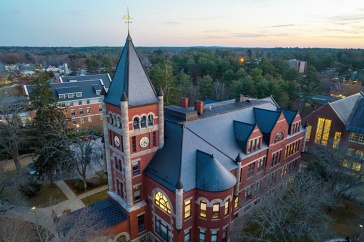UNH Law celebrated a pair of leading women in the world of intellectual property at its commencement ceremony Saturday, May 21, presenting both with honorary degrees.
Sharon Prost, Chief Judge for the United States Court of Appeals for the Federal Circuit, and Michelle Lee, Under Secretary of Commerce for Intellectual Property and Director of the United States Patent and Trademark Office (USPTO), were honored. Prost also delivered the commencement address.
Prost oversees the work of the nation’s leading appellate tribunal for the resolution of intellectual property law disputes; Lee is the first woman ever to serve as director of the USPTO, and is the principal advisor to the President, through the Secretary of Commerce, on domestic and international intellectual property policy matters.
Prost was appointed to the Federal Circuit in 2001 by President George W. Bush. She previously served as Minority Chief Counsel, Deputy Chief Counsel, and Chief Counsel of the Committee on the Judiciary, United States Senate, from 1993 to 2001. She was elevated to the position of Chief Judge in 2014, and it is in that capacity that she oversees the aforementioned appellate tribunal for the resolution of IP disputes.
From 1989 to 1993, Prost served as Chief Labor Counsel (Minority) for the Senate Committee on Labor and Human Resources, and was an Assistant Solicitor, Associate Solicitor, and Acting Solicitor of the National Labor Relations Board from 1984 to 1989. Her prior work included stints as an attorney at the Internal Revenue Service and as a field attorney at the Federal Labor Relations Authority. She also served as Labor Relations Specialist/Auditor at the United States General Accounting Office for four years and Labor Relations Specialist at the United States Civil Service Commission for three years.
Chief Judge Prost received a B.S. from Cornell University in 1973, an M.B.A. from George Washington University in 1975, a J.D. from the Washington College of Law, American University in 1979 and an LLM from George Washington University School of Law in 1984.
Addressing the class of 2015 at UNH Law's commencement, Prost offered the following advice: “There’s so much noise out there … as lawyers, don’t forget, you are the stewards of the law. And no matter how loud the noise, our profession is one of integrity, and this country’s legal and judicial system is the greatest in the world. A law degree is a powerful thing. You will have the opportunity to do great things, to improve the lives of others, to move and shape the rules governing our lives. Take the tools you have learned over the past years and do something of consequence with them.”
Before becoming the first woman to lead the USPTO, Lee previously served as Deputy Director of the same organization, and prior to that was the first Director of the USPTO’s Silicon Valley Regional Office.
Before joining the USPTO, Lee was Deputy General Counsel for Google, and also served as its first Head of Patents and Patent Strategy. She also was previously a partner at Fenwick & West LLP, a Silicon Valley-based law firm. Earlier in her career, Lee was a law clerk for the Honorable Vaughn R. Walker on the US District Court for the Northern District of California and the Honorable Paul. R. Michel on the US Court of Appeals for the Federal Circuit.
Lee was recognized as one of the “Top 50 Most Influential Visionaries in American Public Policy” by Politico Magazine in 2015, and as one of the top 100 most influential women in the Silicon Valley by San Francisco Business Times and San Jose Business Journal in 2013.
Lee earned a BS and an MS in electrical engineering and computer science from MIT, as well as a JD from Stanford Law School.
In her remarks to the UNH Law graduates, Lee said: “Opportunities present themselves sometimes when and where you least expect it, and I viewed public service as an opportunity to make a difference. Now I have the tremendous privilege of being the first woman to lead the United States Patent and Trademark Office in its more than 225 year history. There will be opportunities for all of you to give back to your community, and to your country, no matter what area of the law you choose to practice in. In the years ahead, our communities will only need more able public servants, who can apply the skills that you have honed over these past three years.”















































